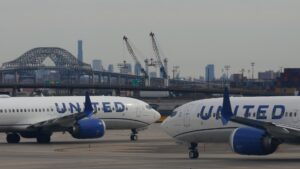United Airlines Takes Major Steps to Address Flight Disruptions at Newark Airport
At a time when air travel continues to be a critical aspect of both business and leisure, recent events at Newark Liberty International Airport have raised serious concerns regarding flight reliability. United Airlines, a significant player in the aviation industry, announced plans to cancel 35 daily roundtrip flights from Newark to combat persistent delays that have frustrated thousands of travelers. This decision comes on the heels of CEO Scott Kirby’s acknowledgment that ongoing issues stemming from staffing shortages among air traffic controllers and technological malfunctions at the Federal Aviation Administration (FAA) are severely impacting operations.
The Situation at Newark Airport: An Overview
As of Friday, Newark has seen over 300 flight delays—the latest in a series of disruptions that have plagued the airport all week. In fact, more than 1,400 flights were either delayed or canceled earlier this week, reflecting a troubling trend in air travel during peak seasons. United’s flight reductions account for approximately 10% of their daily Newark schedule, illustrating the severity of the situation.
Kirby expressed disappointment in a note to passengers, stating, “It’s disappointing to make further cuts to an already reduced schedule at Newark, but since there is no way to resolve the near-term structural FAA staffing issues, we feel like there is no other choice in order to protect our customers.” The cuts are set to commence this weekend, marking a significant step for the airline.
Underlying Causes: Staffing Shortages and Technology Woes
A major factor in these delays has been the reported walk-off of 20% of air traffic controllers at Newark recently, largely due to ongoing technology failures and chronic understaffing. “This facility has been chronically understaffed for years,” Kirby pointed out, emphasizing that the current staffing levels can’t support the volume of flights scheduled.
The FAA acknowledged that staffing challenges were hindering operations significantly, further complicating the situation. Interestingly, United Airlines’ complaint isn’t new; the airline has been vocal about air traffic controller shortages for years, which continues to be a growing concern as the aviation industry recovers from the pandemic.
The Road Ahead: Addressing Capacity Issues
In light of the difficulties, United is advocating for more stringent capacity control at Newark Airport, akin to measures already in place at other heavily trafficked airports, like LaGuardia and Ronald Reagan Washington National Airport. Such restrictions could be essential to maintaining the integrity of flight schedules and ensuring customer satisfaction.
Kirby has also reached out to Transportation Secretary Sean Duffy, commending the current administration’s commitment to overhauling aged air traffic control systems in the U.S. It’s a move that many industry experts believe is overdue and essential for future operational efficiency.
Support for Affected Passengers
In a bid to mitigate customer dissatisfaction, United has announced they will waive change fees or any fare differences for passengers affected by Newark disruptions. This measure aims to provide a layer of comfort during what has been a turbulent travel experience.
Conclusion: The Future of Air Travel at Newark
As one of the nation’s busiest airports, Newark Liberty’s operational challenges reflect broader issues in the aviation industry, from staffing shortages to technological advancements. At Extreme Investor Network, we will continue to monitor the developments closely, providing insights and analyses that go beyond the surface. The aviation landscape is rapidly evolving, and understanding these underlying factors is key for investors and travelers alike.
Stay tuned for more updates as we delve deeper into how airlines and regulators address these critical issues in air travel—ensuring that reliability, safety, and profitability are at the forefront as we all navigate this complex ecosystem.

